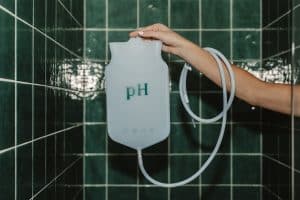Earlier this week, we discussed how massage can help with sports, exercise and athletic recovery. Today we dig deeper and explore how good nutrition and a well-balanced diet can set the right foundations for both performance and recovery.
There are two main categories nutrients can be divided into, and these are your Macronutrients and your Micronutrients. Macronutrients are needed in large amounts and provide your body with energy, and more commonly known as your Proteins, Carbohydrates and Fats. Micronutrients are needed in smaller amounts, and include nutrients like Vitamins and Minerals.
Both Macronutrients and Micronutrients are important in fuelling our bodies, but this becomes even more important when you’re an athlete or someone who is very active and consistently moving and pushing your body. This creates an increased demand for nutrients by the body, and if you’re not meeting these demands, you’re at risk of lowered performance, a slower recovery, injuries or even long-term health issues if it’s been ongoing for a long period of time.
In this two part blog series, we consider the importance of these nutrients and the functions they have within the body, the best sources for them and how to best utilise them within your training and recovery plan.
PROTEIN
Whether you’re a seasoned athlete or have only just started your fitness journey, you’ll have heard about protein being important when exercising. But why? Why is this Macronutrient so important? Protein is known as the building blocks in our body, and can be found in most of our body’s structural parts like bone, muscle, skin and tendons.
When Protein is consumed, it gets broken down in the intestine to its simpler form – amino acids. From there it travels to the liver to get broken down even further before being transported through the blood to your muscles, where it gets used to help both build and repair muscle tissue. There are 20 amino acids needed by the body, 12 of these we can make ourselves, leaving 8 that we require from our diet which are called your Essential Amino Acids.
Good Sources of Protein
Animal sources of Protein: red meat, poultry, fish, eggs and dairy products (grass fed, organic or free range is best when consuming animal products, both from a nutritional and ethical point of view)
Plant sources of Protein*: legumes like chickpeas, beans, peas and lentils, tofu/tempeh, nuts, seeds, quinoa, hemp seeds, chia seeds
*While there are various vegetarian Protein sources, it is important to note that many do not contain all 8 Essential Amino Acids, except quinoa, chia seeds and hemp seeds. So while it is a bit harder for non-meat eaters to obtain all Essential Amino Acids, it’s definitely not impossible. The key is ensuring you have a varied diet with many types of Protein sources.
CARBOHYDRATES
Carbohydrates are a key component in an athlete’s diet as they are such a rapid and readily available source of energy for the body. When carbohydrates are consumed, they get broken down into glucose. This glucose is either used for energy, or stored as glycogen in the liver or muscles for use later. When energy is needed, the glucose in your blood is utilised first, and then for intense and prolonged activity where more energy is required, the stored glycogen is broken back down into glucose and used.
Carbohydrates eaten prior to a work out can help provide an easy to utilise energy source for the body during the workout, and when consumed after an endurance based workout (like a long run) it can also help to replenish those glycogen stores you used up.
Good Sources of Carbohydrates:
Wholegrains like buckwheat, spelt, wholewheat, steel cut/rolled oats, sorghum and quinoa, beans, lentils and chickpeas and root vegetable like sweet potatoes, carrots, pumpkin.
What is “Carb Loading”?
This is something that is done by many long distance runners in the lead up to a race, and it is basically decreasing activity and increasing carbohydrate intake in the 1-3 days before the event to help increase glycogen stores. This increase in glycogen can help to reduce fatigue and improve performance during the race.
FATS
This is the one Macronutrient that often gets forgotten about, or even omitted (which is a scary thought) in the pursuit of a “healthy” lifestyle. But Fats are crucial for a healthy and well-functioning body. They provide long-term energy storage for the body to use, transport fat soluble vitamins like A, D, E and K for the body to use and help with hormone production. For women, this is vital as too much exercise or endurance training can result in the loss of a period due to a combination of lack of body fat, lack of dietary fat intake and the increased stress on the body. A non-menstruating body is often an unhealthy one, so ensuring adequate fat intake will help to reduce the risk of this happening.
Good Sources of Fat:*
Animal Sources of Fat: fish like salmon, tuna and herring, butter, full fat greek yoghurt, ghee and animal fat (again – ensure it’s good quality, so grass fed, organic etc)
Plant Sources of Fat: avocado and avocado oil, nuts/nut butter, seeds like chia, flax and hemp, flaxseed oil, LSA (ground up linseed, sunflower and almond meal),
*Essential Fatty Acids like Omega 3 cannot be made by the body, and so we require these from our diet. These fats play vital roles in so many functions in the body, but for athletes the most important one to note is their role in reducing inflammation and the protective quality they have for joints and joint mobility. In weight bearing exercises like running, protecting the joints is vital for long term health and reducing the risk of injury. These Essential Fatty Acids are highest fish like salmon, tuna and herring, but can also be found in chia, hemp and flax seeds/oils.
In Part Two of this series, we will look at the role of Micronutrients and which ones are needed most by healthy adults and athletes so make sure you tune in for that!
If you’d like more guidance on nutrition and what will work best for your body and it’s individual needs, book in for a Nutrition consult with Laura. She will evaluate your current diet, lifestyle and health issues and help you to create a sustainable and achievable plan of action to help you reach your goals.
By Laura Phongsavath
Holistic Nutritionist / pH Clinic Manager
Adv Dip. Nutritional Medicine
ATMS #50697


